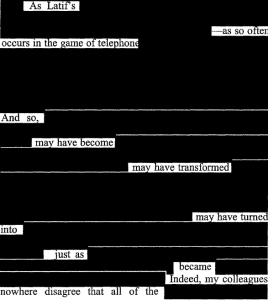10 Years of emptywheel: Key Non-Surveillance Posts 2011-2012
Happy Birthday to me! To us! To the emptywheel community!
On December 3, 2007, emptywheel first posted as a distinct website. That makes us, me, we, ten today.
To celebrate, over the next few days, the emptywheel team will be sharing some of our favorite work from the last decade. I’ll be doing probably 3 posts featuring some of my most important or — in my opinion — resilient non-surveillance posts, plus a separate post bringing together some of my most important surveillance work. I think everyone else is teeing up their favorites, too.
Putting together these posts has been a remarkable experience to see where we’ve been and the breadth of what we’ve covered, on top of mainstays like surveillance. I’m really proud of the work I’ve done, and proud of the community we’ve maintained over the years.
For years, we’ve done this content ad free, relying on donations and me doing freelance work for others to fund the stuff you read here. I would make far more if I worked for some free-standing outlet, but I wouldn’t be able to do the weedy, iterative work that I do here, which would amount to not being able to do my best work.
If you’ve found this work valuable — if you’d like to ensure it remains available for the next ten years — please consider supporting the site.
2011
DOJ Points to David Passaro’s Trial as Proof We Investigate Torture, But It Actually Proves John Yoo Should Be Tried
I’v written a lot about the David Passaro case — the only one associated with the CIA (he was a contractor training Afghans) to be prosecuted for abuse. This post summarizes a lot of the problems with his case and its use to claim that the US ever held itself responsible for torture.
One Year After Collateral Murder Release, DOD’s Networks Are Still Glaring Security Problem
I’ve done a ton of posts on how the government complains about leaks even while it fails to close gaping security holes in its networks. This was one of the first. A day later I noted that DOD wasn’t aspiring to fix these problems until 2013; as it would turn out, Edward Snowden managed to download NSA’s crown jewels before they would fix them.
The Drone War on Westphalia
For Independence Day in 2011, I wrote a post arguing that the damage the use of drones will do to sovereignty will pose a real problem, particularly with regard to the consent of the governed. In a follow-up I argued against invoking “national security” to defend policies that weaken the nation.
Pakistani Bounty Claims: Adnan Farhan Abd Al Latif and TD-314/00684-02
In the first of a bunch of posts on Adnan Farhan abd al Latif, I showed that the intelligence report on which his detention relied — which Judge Henry Kennedy had originally deemed unreliable — probably was used to detain a bunch of people turned over with bounties.
49% of Michigan’s African Americans to Lose Their Right to Self-Governance
As the country started focusing on MI’s disastrous policy of emergency managers, I was the first to note the moment when half of Michigan’s African Americans lost their right to local self-governance.
2012
Why Has the Government Story about Who Ordered the UndieBomber to Attack the US Changed?
As part of an effort to justify drone-killing Anwar al-Awlaki, the government publicly blamed him for all of Umar Farouk Abdulmutallab’s attack on the US, blame which should have been shared with others in AQAP. This was the first post where I made that clear.
“The Gloves Come Off” Memorandum of Notification
I discovered that language the government was trying to keep classified in the ACLU torture FOIA was not (as ACLU mistakenly believed) a description about waterboarding, but instead an admission that torture was authorized by the September 17, 2001 Memorandum of Notification that authorized a bunch of other programs. This was a key post in a series of posts on the MON.
US Climate Inaction: Blame Dick Cheney
I believe the US invaded Iraq as part of a Cheney-backed decision to double down on our petroleum-based hegemonic position in the world, in the apparent belief that we can clean up the damage from climate change at some later time. Even our shift to fracking is more about power than the environment. Given how catastrophic the Iraq war was, and given everything that has occurred since — not least our singular abstention from the Paris Accord — I think it a particularly ironic choice.
Lanny Breuer Covers Up Material Support for Terrorism
I wrote a ton about Obama’s failure to prosecute the banks that blew up the world’s economy. One of the most important ones was the post where I laid out Lanny Breuer’s efforts to hide the fact that HSBC had materially supported al Qaeda. Of course, it got no more than a hand slap even as Pete Seda was in prison for closely related actions (Seda’s case ultimately blew up).
Other Key Post Threads
10 Years of emptywheel: Key Non-Surveillance Posts 2008-2010


